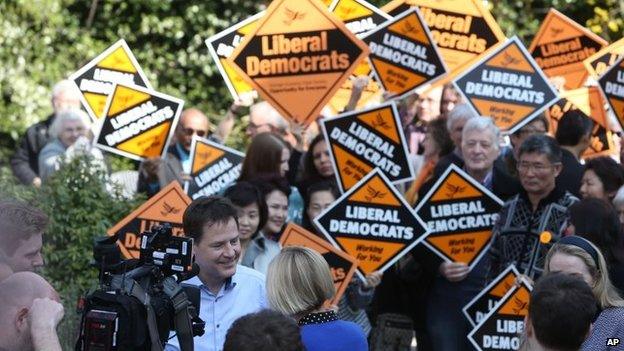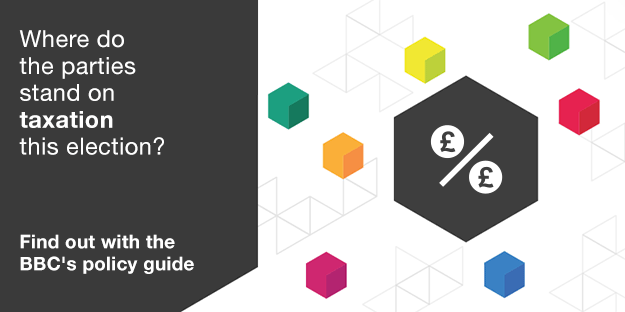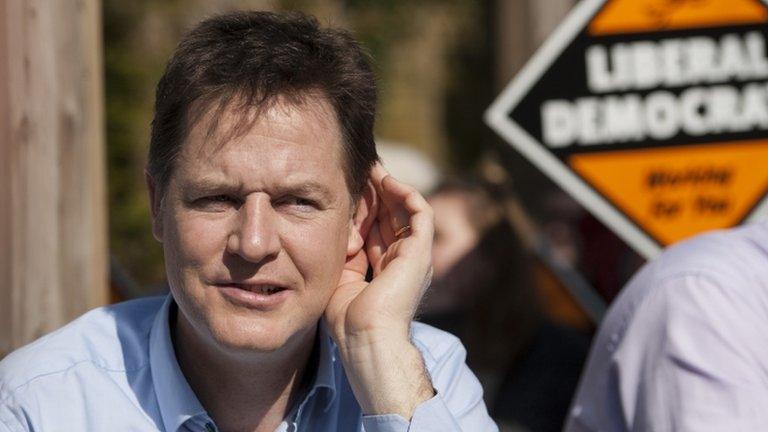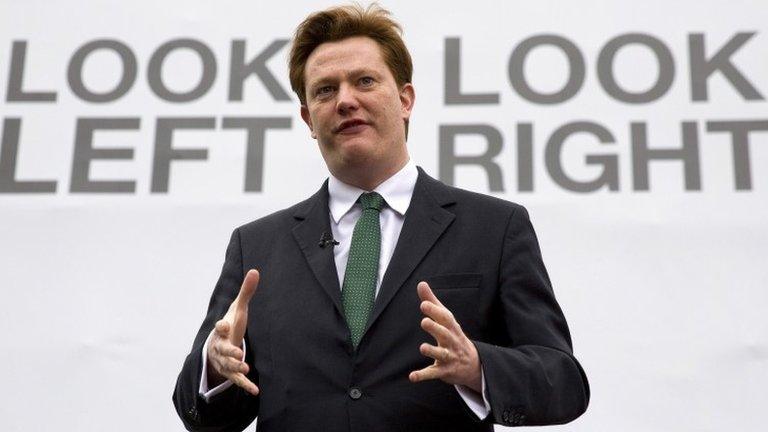Election 2015: Battle on tax, benefit and pension changes
- Published
- comments
David Cameron: "Britain would pay a heavy price for a Labour government, and it would start with you and your pay packet"
The official start of the new tax year has sparked a fresh battle between Labour and the Conservatives over their respective economic plans.
David Cameron says 94% of working households are better off under tax and benefit changes brought in on Monday.
However, Labour's Ed Balls claims the result is that families are on average £1,100 a year worse off than in 2010.
Both parties say their rivals have secret plans to raise taxes if they win the general election.
The Lib Dems, meanwhile, are angry with the Conservatives for claiming credit for an increase in the personal income tax allowance, which they say they had to force Tory ministers to accept.
The personal allowance - the amount someone can earn before they are taxed - has gone up from £10,000 to £10,600.
Both former coalition partners have both said they want it to go up to £12,500 by 2020, but senior Lib Dem David Laws said his party would implement this "far faster".
In other election news:
Chief Secretary to the Treasury Danny Alexander says he heard an unnamed senior Tory tell a Lib Dem colleague: "You take care of the workers and we'll take care of the bosses"
Scottish Labour leader Jim Murphy launched his party's campaign with a series of pledges to end what he called "Tory austerity"
A centre-left think tank says young people should be forced to vote in the first election after they turn 18
A "sacked" Conservative parliamentary candidate joined UKIP, amid a row in the Hull West and Hessle constituency
The Green Party named a new parliamentary candidate for Erewash after Victoria Martindale, who was serving a suspended jail sentence, stepped down
Speaking in Bristol to party members, Mr Cameron said the Conservatives had taken three million of the lowest paid people out of income tax and, overall, 26 million people were getting a tax cut.
"I don't just want people to see Britain's recovery on the TV or hear it on the radio, I want them to feel it in their lives," he said.
"Thanks to today's changes they are."
'Work punished'
He said he was making a "vow to working people", adding: "No income tax raise, no VAT rise, no national insurance rise - that is our vow."
Mr Cameron said there was a "moral case" for low taxes and that the choice at the next election was "clearer than ever".
"Tax cuts with us, tax rises with Ed Miliband and Labour. Work rewarded with us, work punished with them."
Appearing alongside the Tory leader, Chancellor George Osborne described pension changes as "far-reaching reforms" offering "unprecedented freedoms" over pensioners' savings.
Shadow Chancellor Ed Balls: "Tory governments always raise VAT. They did it last time and given another chance they'll do so again"
Speaking earlier in Leeds, shadow chancellor Ed Balls said: "Families are £1,100 a year worse off on average - that is the true cost of a Tory chancellor."
He cited independent figures from the Institute for Fiscal Studies which he said took into account all of the changes David Cameron and his government had introduced since May 2010 up until Monday, including the change to the personal allowance.
"Their damning conclusion is that low-income households with children lose the most as a percentage of their income from changes implemented by the coalition. While millions are paying more, we know that millionaires are paying less," he said.

Analysis, by BBC political correspondent Carole Walker, travelling with David Cameron:
There is another flipside to the commitment to low taxes. The Tories need to save £30bn to eliminate the deficit by 2017-18 and if they won't put up taxes, all the money will have to come from spending cuts.
They have said they will save £5bn by cracking down on tax avoidance, £13bn from departmental spending and £12bn from welfare.
But there remain big unanswered questions on which benefits and which government projects will have to be axed.
Labour faces similar questions about which taxes it would increase and what public spending it would cut to meet its commitment to eliminating the deficit as soon as possible in the next parliament.

He repeated Labour's claim that a Conservative government would increase VAT to make their sums add up - something denied again by Mr Cameron on Monday.
The Conservatives claim Labour would be forced to increase National Insurance contributions to pay for their spending plans.

Nick Clegg was on the campaign trail in Surbiton on Monday
Liberal Democrat leader Nick Clegg attacked Labour's policies as "economically illiterate", but also warned that Chancellor George Osborne was "a very dangerous man" because of his plan to balance the books through spending cuts alone.
Raising the income tax threshold had been a flagship Lib Dem policy in 2010, which Mr Cameron had dismissed as "unaffordable". And despite the prime minister's claim that the latest change was "all thanks to the Conservatives", Mr Clegg claimed Tory ministers had opposed the move during coalition talks.
The Lib Dem leader said he had pushed for tax cuts for low and middle-income workers at every one of the coalition's budgets, claiming the Conservatives "were always more interested in tax cuts for people at the top rather than tax cuts for people at the bottom or the middle".
One of the biggest changes which came into force on Monday was the relaxation of pension rules, so that those with a defined contribution pension "pot" can take out as much as they like when they reach the age of 55.
Lib Dem Pensions Minister Steve Webb said the principle was to trust people with their own money - but he urged people to seek advice and not rush into any decisions.

Labour's pensions spokesman Gregg McClymont welcomed the "flexibility" in the new system but voiced concerns the pensions industry was "finding it difficult to adapt so quickly to such a big change".
Other changes which came into effect included a higher limit on ISA savings, the Marriage Tax Allowance, a 2.5% increase in the state pension, the abolition of employer National Insurance on under 21-year-olds and the scrapping of the 10p tax band on savings. Working age benefit increases have also been capped at 1%.
Subscribe to the BBC Election 2015 newsletter to get a round-up of the day's campaign news sent to your inbox every weekday afternoon.
- Published5 April 2015

- Published6 April 2015
